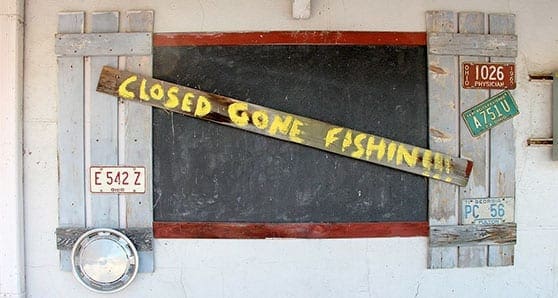 I have a great disappearing act, though my wife Margaret doesn’t appreciate it much.
I have a great disappearing act, though my wife Margaret doesn’t appreciate it much.
I usually do this act when company comes over and stays late. If they don’t get the hint when I blow out all of the candles, I’ll say that I’m going up to do laundry. Or when they’re a little unfamiliar to me or friends of Margaret’s, I just disappear.
I imagine them not missing me for an hour or two, and then getting a hint and going home after a great evening.
In reality, I hear about it the next day when Margaret tells me that I keep the hours of an eight-year-old and that she’s embarrassed by my antics.
Disappearing a business is usually much harder. We can blow out the candles, turn off the lights, put a sign on the door, send our employees home and tell them that the party is over. But there’s usually much more to it. Deciding to close up shop comes after a lot of stress, shame and disappointment. It’s so stressful for business owners. But it happens every day.
I had to close up shop once. One of my first ventures 30 years ago was a company called Winewear Fashions Ltd. My parents had a “great idea for a new wine cooler.” They had friends over late, lots of wine, and instead of disappearing the idea, they kept it and told me about it the next day. My brother Rob and I thought it was good, too. Rob disappeared down south, and I decided to run with the idea and built a company around it. I built a prototype, came up with a plan, sold shares in the company to friends and family, and went on the road selling the product.
I struggled for almost two years. I didn’t take wages, I lived off my savings and the goodwill of family. I had to pay back investors and I didn’t know how. I prayed a lot!
There was the shame of not being as successful as I portrayed and the disappointment of knowing that the venture was failing. The sense of being overwhelmed with all the details.
One day I got the idea of selling the business, and then was lucky enough to find a couple guys who bought into my vision and wanted to buy it. They didn’t pay me as much as I wanted but I was able to pay back my investors most of their money.
The company disappeared and so did the stress.
Sometimes I talk with business owners who would just like their business to disappear. They say things like, “I just want it to go away. If I had a buyer, I would sell it right now. I’m so overwhelmed, I don’t know what to do next. I’d like to quit but I can’t.”
Most business owners have so much tied up in their business that they have no option but to continue. They have invested their life savings – and money that wasn’t theirs. Perhaps the business is slightly profitable but they know that no one else would want to buy it.
What can they do?
Here are five things you can do if you’re in this situation:
- Plug profit holes. You need to stop the bleeding. Talk to your accountant or get a business coach to help you if you don’t know how to do this quickly.
- Get your team working. Nobody wants to buy a business where you’re micromanaging every detail.
- Look for additional markets for your product or service. Buyers want to know that there is potential for growth.
- Come up with a plan for the future. Yours and the business. Without a plan, it’s only a pipe dream. You need to know what you want and start moving in that direction.
- When all else fails, close it down. If you really can’t make the business go, there’s no shame in shutting the doors. Remember you are not the business. The business might have failed but you didn’t. In fact, you did what so many people only dream about. You learned so much and grew so much.
Disappearing is so difficult for entrepreneurs. There are many details that need to be taken care of.
But at the end of the day, selling or closing down a business when no buyer can be found can save your life. The stress associated with a struggling business can suck the life out of you.
I know, I’ve been there.
Troy Media columnist David Fuller, MBA, is a certified professional business coach and author who helps business leaders ensure that their companies are successful. David is author of the book Profit Yourself Healthy.
The views, opinions and positions expressed by columnists and contributors are the author’s alone. They do not inherently or expressly reflect the views, opinions and/or positions of our publication.

